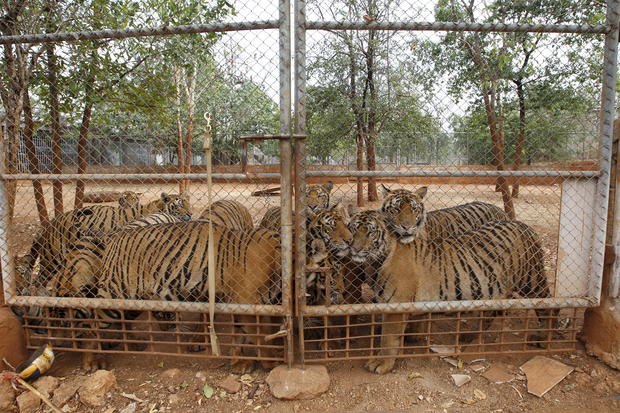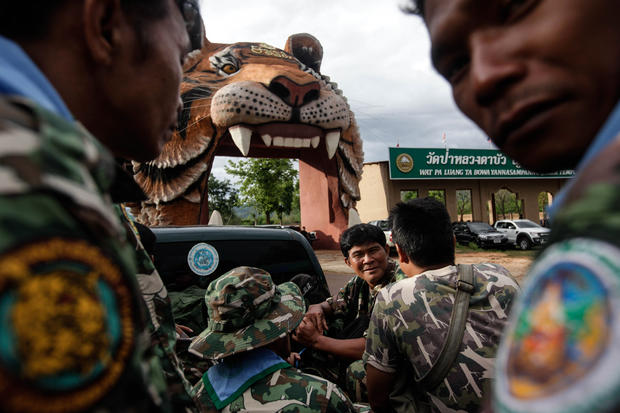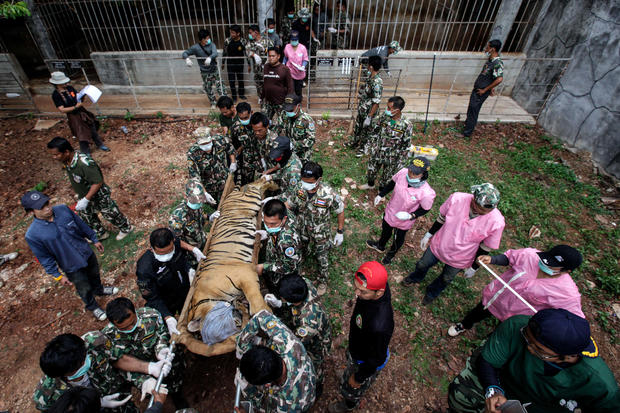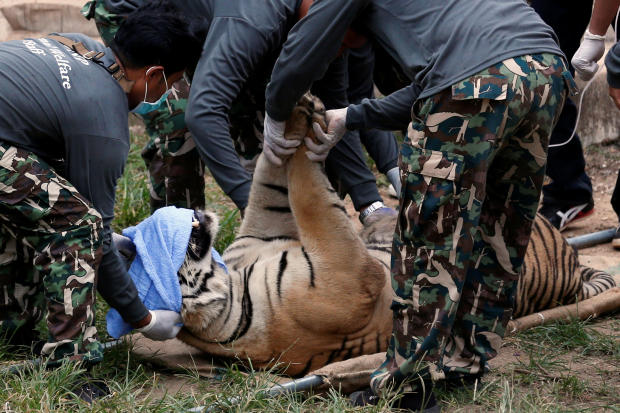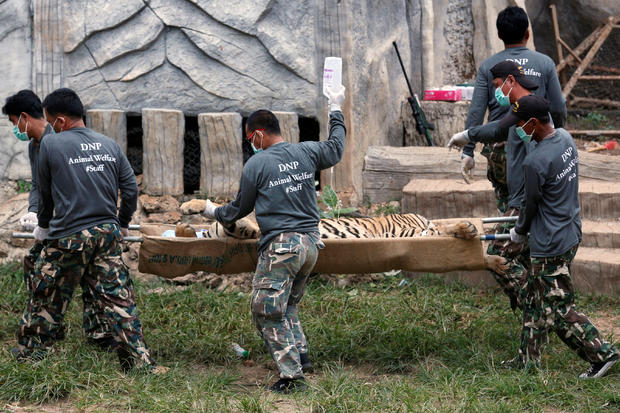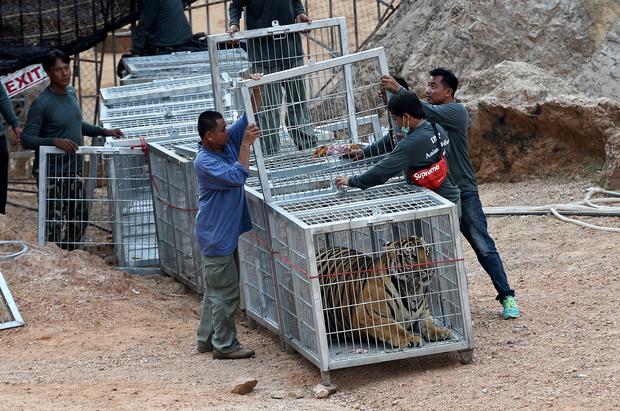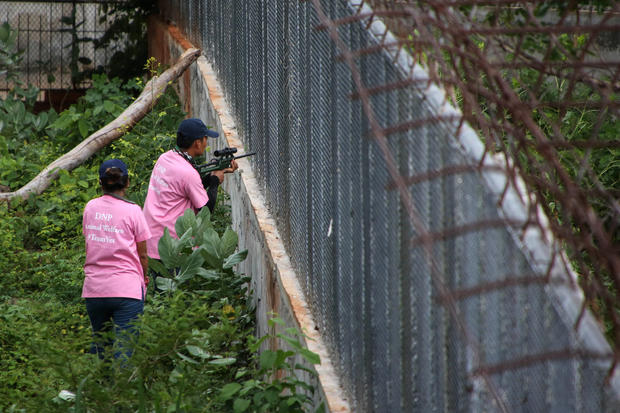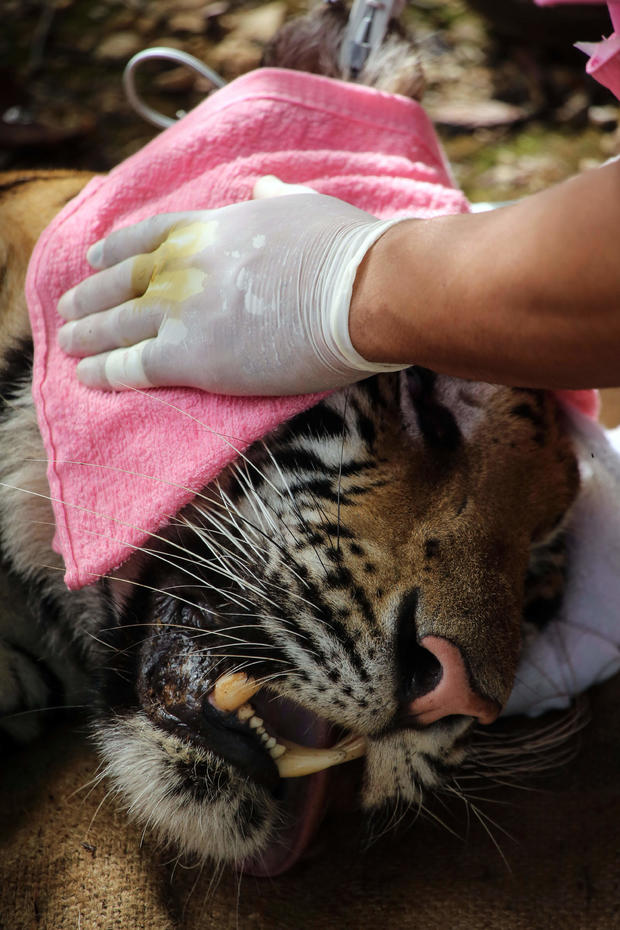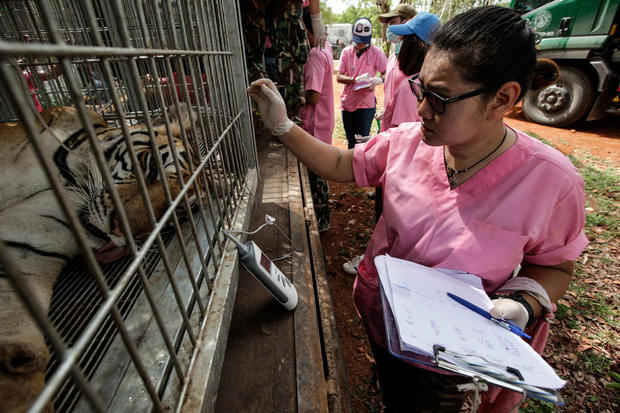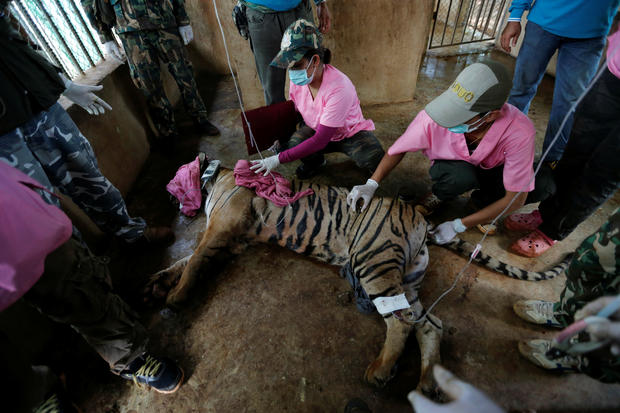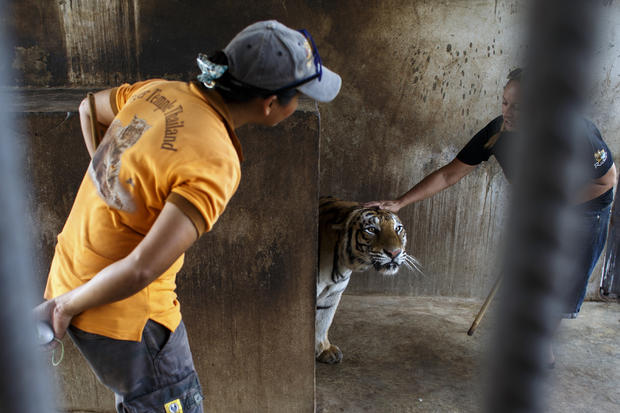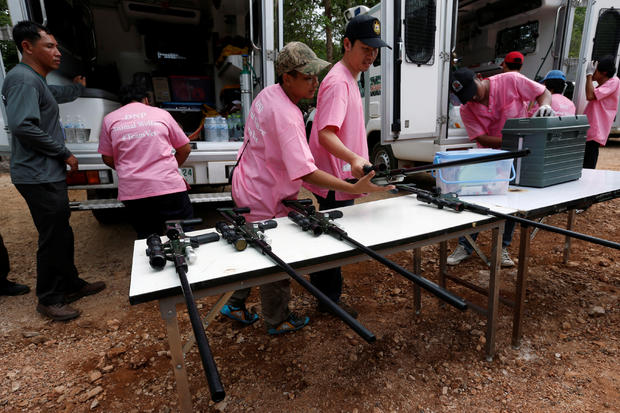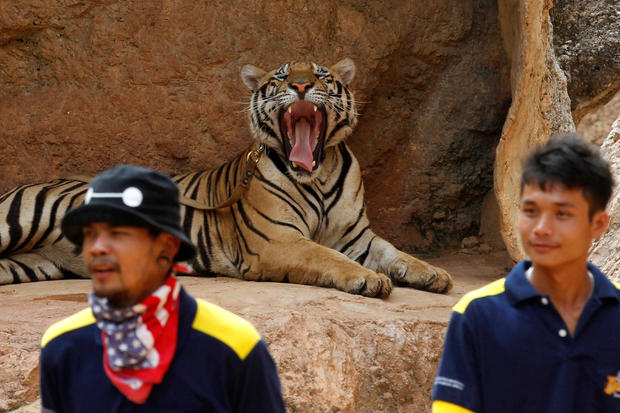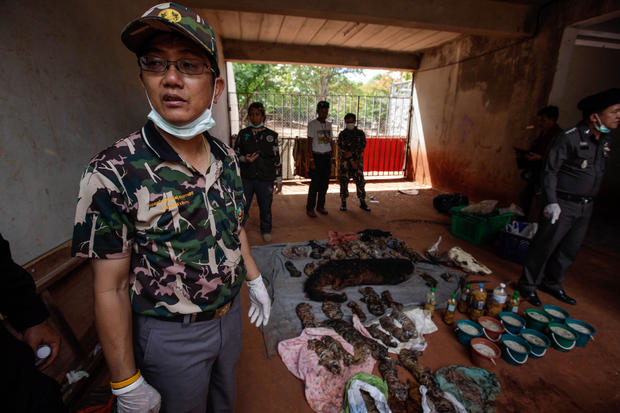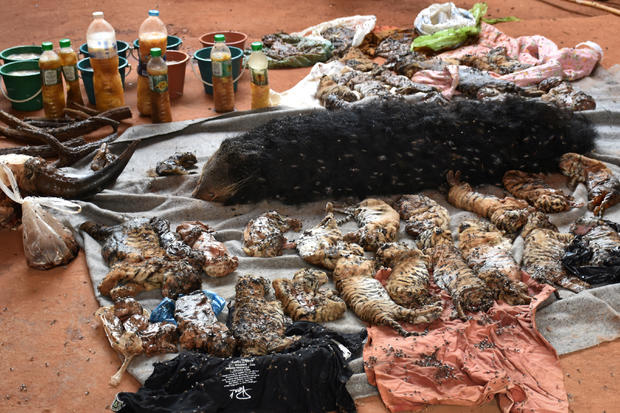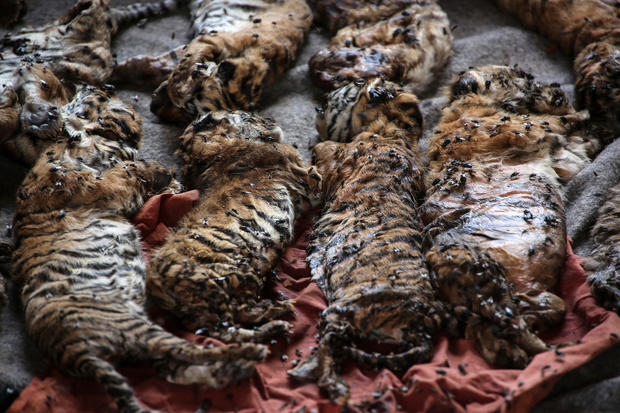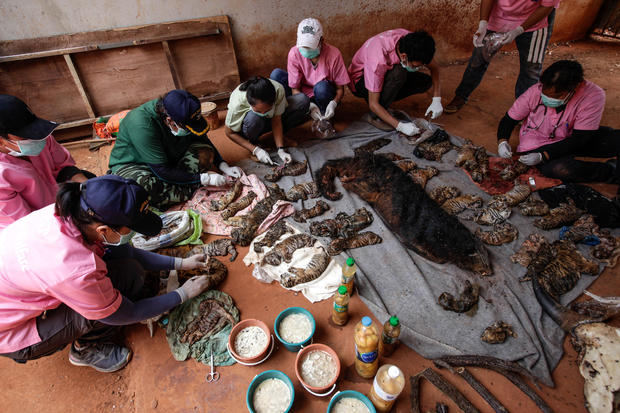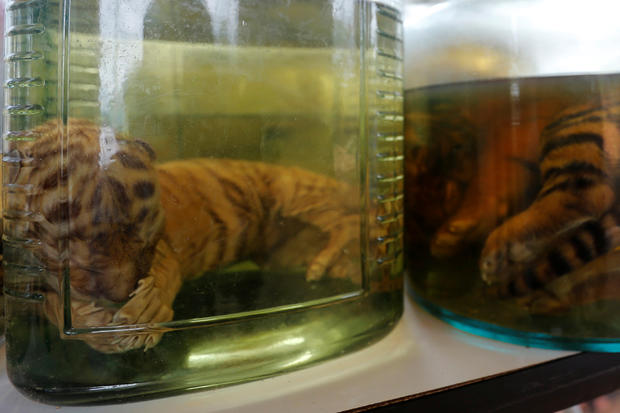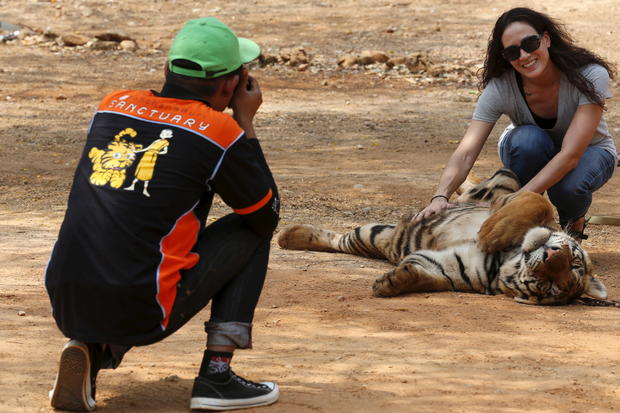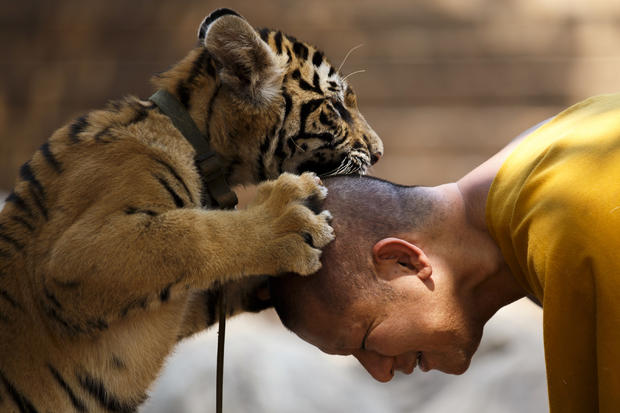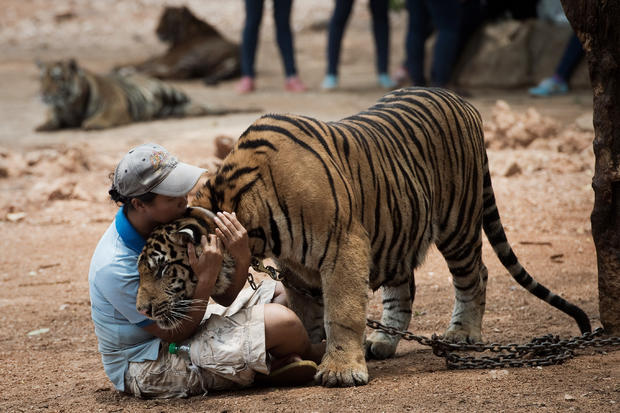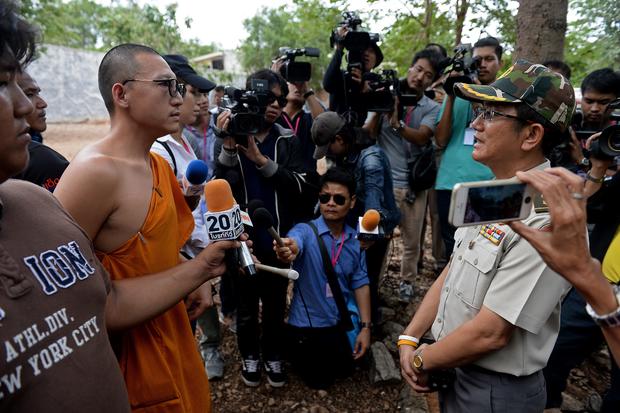Thailand's Tiger Temple raid
The controversy surrounding Thailand's Tiger Temple, dogged for years by talk that it supplies the black market and mistreats its animal, exploded in full force last week when wildlife officers seized 137 big cats the end of May 2016.
Many conservationists and animal rights activists have believed the temple's self-appointed mission to shelter tigers is misguided at best and that the tigers were mistreated to ensure their docility. Tiger parts found during the raid buoyed strong suspicions that the temple, run as an admission-charging zoo, engaged in unethical breeding and illegal trafficking of the endangered animals.
Bengal tigers are seen behind a fence at the Tiger Temple in Kanchanaburi province, west of Bangkok, February 25, 2016.
Thailand's Tiger Temple
Thai Department of National Parks (DNP) officers sit on a truck at the entrance of the Wat Pha Luang Ta Bua Tiger Temple on June 1, 2016 in Kanchanaburi province.
Wildlife authorities in Thailand raided the Buddhist temple in Kanchanaburi, where 137 tigers were kept, following accusations the monks were illegally breeding and trafficking endangered animals. Forty of the 137 tigers were rescued by Tuesday, May 31, from the country's infamous Tiger Temple despite opposition from the temple authorities.
Thailand's Tiger Temple
Thai DNP officers carry a sedated tiger out of its cage at the Wat Pha Luang Ta Bua Tiger Temple on June 1, 2016 in Kanchanaburi province.
Thailand's Tiger Temple
A sedated tiger is stretchered as officials start moving tigers from Thailand's controversial Tiger Temple, a popular tourist destination, which has come under fire in recent years over the welfare of its big cats in Kanchanaburi province, west of Bangkok, May 30, 2016.
Thailand's Tiger Temple
A sedated tiger is moved from Thailand's Tiger Temple in Kanchanaburi province, May 30, 2016.
Thai police stopped a truck May 26, which was carrying two tiger skins and other animal parts, as it was leaving the Buddhist temple, a police officer said. The discovery came as authorities were transferring 137 live tigers, mostly adults, from the temple to animal shelters after obtaining a court order.
Two men in the truck carrying the tiger skins were arrested and charged with possession of illegal wildlife, said police Col. Bandith Meungsukhum. He said a monk traveling with them will be arrested once he is defrocked.
The temple's English-language Facebook page, which has criticized government efforts to take away the tigers, claimed surprise at what was found.
Thailand's Tiger Temple
Thai wildlife officials use a tunnel of cages to capture a tiger and remove it from an enclosure at the Wat Pha Luang Ta Bua Tiger Temple in western Thailand on May 30, 2016.
The temple stands accused of selling off the big cats for slaughter. An adult tiger skin can fetch anywhere from $6,000 to $10,000, according to Steve Galster, the director of Freeland, an organization that fights wildlife trafficking. Galster said he believes the temple was breeding tigers to sell them, either alive or in parts, into the lucrative illegal wildlife trade.
Thailand's Tiger Temple
A Thai DNP veterinarian officer aims as he shots a sedative darts to a tiger in a cage at the Wat Pha Luang Ta Bua Tiger Temple on June 1, 2016.
Thailand's Tiger Temple
A Thai DNP veterinarian officer holds the head of a sedated tiger at the Wat Pha Luang Ta Bua Tiger Temple on June 1, 2016 in Kanchanaburi province, Thailand.
Thailand's Tiger Temple
A Thai DNP veterinarian officer checks a tiger's temperature at the Wat Pha Luang Ta Bua Tiger Temple on June 1, 2016.
Thailand's Tiger Temple
A sedated tiger is seen in an enclosure as officials continue moving live tigers from the temple, June 3, 2016.
The Department of National Parks has been overseeing the transfer of the temple's tigers to shelters.
Thailand's Tiger Temple
Volunteers comfort a Bengal tiger inside a cage at the Wat Pa Luang Ta Bua, otherwise known as the Tiger Temple, in Kanchanaburi province, February 12, 2015.
The temple has been criticized in the past by animal rights activists because of allegations it is not properly set up to care for the animals and flouted regulations restricting the trade of tigers.
Thailand's Tiger Temple
Officials prepare weapons with a sedation as they start moving tigers from the temple, May 30, 2016.
Thailand's Tiger Temple
A tiger yawns before officials start moving them from the Tiger Temple, May 30, 2016.
The temple has been criticized in the past by animal rights activists because of allegations it is not properly set up to care for the animals and flouted regulations restricting the trade of tigers.
Thailand's Tiger Temple
Deputy DNP director-general Adisorn Nuchdamrong stands by the carcasses of 40 tiger cubs and a binturong (also known as a bearcat) found undeclared at the Wat Pha Luang Ta Bua Tiger Temple on June 1, 2016 in Kanchanaburi province, Thailand.
Thailand's Tiger Temple
Dead tiger cubs are displayed by Thai officials after they were found during a raid on the Tiger Temple in Kanchanaburi province, June 1, 2016.
Forty dead tiger cubs were found in a freezer where the temple staff kept food, said Anusorn Noochdumrong, an official from the Department of National Parks.
Thailand's Tiger Temple
The carcasses of 40 tiger cubsfound undeclared are displayed at the Wat Pha Luang Ta Bua Tiger Temple on June 1, 2016 in Kanchanaburi province, Thailand.
Wildlife authorities in Thailand raided a Buddhist temple in Kanchanaburi province where 137 tigers were kept, following accusations the monks were illegally breeding and trafficking endangered animals. Forty of the 137 tigers were rescued by Tuesday from the country's infamous 'Tiger Temple' despite opposition from the temple authorities.
Thailand's Tiger Temple
Thai DNP officers collect samples for DNA testing from the carcasses of 40 tiger cubs and a Binturong (also known as a bearcat) found undeclared at the Wat Pha Luang Ta Bua Tiger Temple on June 1, 2016 in Kanchanaburi province, Thailand.
Wildlife authorities in Thailand raided a Buddhist temple in Kanchanaburi province where 137 tigers were kept, following accusations the monks were illegally breeding and trafficking endangered animals. Forty of the 137 tigers were rescued by Tuesday from the country's infamous 'Tiger Temple' despite opposition from the temple authorities.
Thailand's Tiger Temple
Tiger cub carcasses are seen in jars of liquid as officials continue moving live tigers from the controversial Tiger Temple, June 3, 2016.
Authorities found 20 jars containing preserved young tigers in the vet's office at the temple -- a day after 40 dead tiger cubs were found in a freezer at the temple.
The temple's English-language Facebook page, which has criticized government efforts to take away the tigers, claimed surprise at what was found.
Thailand's Tiger Temple
A tourist poses for picture at the Tiger Temple in Kanchanaburi province, February 25, 2016.
The temple is a popular tourist attraction that charged admission for visitors to take photos with tigers.
Thailand's Tiger Temple
A Buddhist monk plays with a tiger at the Wat Pa Luang Ta Bua in Kanchanaburi province February 12, 2015.
The temple recently made arrangements to operate as a zoo, but the plan fell through when the government determined that the operators failed to secure sufficient resources. The monks resisted previous efforts to take away the tigers, but relented after police obtained a court order.
Thailand's Tiger Temple
A warden hugs a tiger at the Tiger Temple in Kanchanaburi province on April 24, 2015.
Thailand's Tiger Temple
A Thai wildlife official speaks with a monk before officials removed tigers from enclosures at the Wat Pha Luang Ta Bua Tiger Temple on May 30, 2016.
Thai wildlife officials armed with a court order on May 30 resumed the treacherous process of moving tigers from a controversial temple which draws tourists as a petting zoo,.
